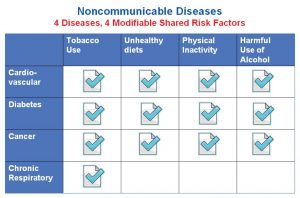Qualification: MPH, Ph.D. Public Health
An interesting article by one of our faculties Dr. Kishore Adhikari on Behavioral Factors in Health and Diseases. To know more continue reading…..
Non-communicable diseases (NCDs) are diseases that cannot be spread from one person or animal to another person. Most NCDs have resulted from our unhealthy behavior so these are also called diseases of unhealthy behaviors. The leading causes of NCD deaths in 2015 were cardiovascular diseases (17.7 million deaths, or 45% of all NCD deaths), cancers (8.8 million, or 22% of all NCD deaths), and respiratory diseases, including asthma and chronic obstructive pulmonary disease (3.9 million). Diabetes caused another 1.6 million deaths according to the World Health Organization (WHO).
If you think that “NCDs are the rich man’s disease” then you are wrong. There were the days when most elite groups used to be the victim of these kinds of diseases but if you watch the present scenario you can feel the differences that the patterns of disease and their victims have been modified drastically for the past few decades. According to WHO, 56.4 million global premature deaths were recorded in 2015 were 39.5 million or 70% of deaths were due to NCDs. Among total premature deaths, more than 80% of deaths were in the low & middle-income countries.
If you are thinking that NCDs appeared only after the forties or fifties, you are wrong again. In developing countries, there is evidence that a significant proportion of the prevalence of the common NCDs like diabetes and cardiovascular diseases (CVDs) is now occurring in the productive age group resulting country’s economy to a miserable level.
What are the major risk factors of NCDs?
A risk factor is any attribute, characteristic or exposure of an individual that increases the likelihood of developing a disease or injury. Some examples of the more important risk factors are overweight, high blood pressure, tobacco, and alcohol consumption, etc. The risk factors of NCDs can be classified into 3 groups:
- Modifiable risk factors/Behavioral risk factors
Tobacco and alcohol use, unhealthy diet and physical inactivity are examples of modifiable risk factors. These types of risk factors can be modified.
- Non-Modifiable Risk factors/Background risk factors.
Age, sex, level of education and genetic composition are some of the examples of non-modifiable risk factors. These types of risk factors cannot be changed.
- Intermediate/physiological risk factors
Elevated blood lipids, diabetes, high blood pressure, and overweight/obesity are examples of intermediate-risk factors. These risk factors can be controlled by modifying our lifestyles.
NCDs are caused, to a large extent, by FOUR behavioral risk factors i.e. tobacco use, physical inactivity, unhealthy diet, and the harmful use of alcohol. These behavioral risk factors lead to four key metabolic/physiological changes i.e. raised blood pressure, overweight/obesity, raised blood glucose and raised cholesterol. The table below shows four modifiable risk factors and their relation with four major killer NCDs globally.

Adopt healthy behavior, stay healthy
- Exercise every day: 30 minutes brisk walk per day for at least 5 days a week.
- Reduce Salt intake: take less than 10 grams (1tea spoon) of salt per day (for the temperate region, not more than 5 grams per day.
- Avoid tobacco: both first hand and second hand (passive) smoking can increase the chances of NCDs.
- Avoid access use of alcohol: limit to <60 ml per day.
- Avoid fatty food: limit to <30 grams of fats per day and preferably, 50% of fat consumed should be from unsaturated fats (fats from plant origin).
- Stay stress-free: stress leads to many NCDs, do YOGAs/Meditation to reduce stress.
- Add green leafy vegetables and fruits daily in your diet and make habit of taking wholegrain cereals and avoid over milled staple foods.
- Avoid junk foods i.e. noodles, soft drinks, roadside foods, etc.
Your Health is typically the Outcome of Your Own Behavior!!!




